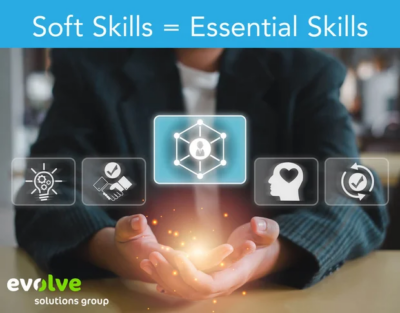Soft skills like empathy, communication, and critical thinking are often mentioned as essential skills in today’s workforce. I have to admit I’m not a fan of the term “soft skills” because these skills are anything but “soft”- they’re vital. They empower people to succeed in their careers, relationships, and their lives. With the emergence of AI and other technologies, these skills are what make us unique and valuable in a world where technology is automating more and more of our daily tasks.
You may have heard something like, “These skills can’t be taught; a person either has them or they don’t,” but I don’t believe that to be true. These skills can be enhanced, drawn out, and supported through various types of learning experiences. And these skills are needed now more than ever in the changing landscape of the workplace.
We’ll start with the skill of empathy, which ties directly into many other skills such as communication, collaboration, and conflict management. In his book A Whole New Mind: Why Right Brainers Will Rule the Future Daniel Pink suggests that empathy involves understanding and sharing the feelings of others, which is crucial for building relationships, fostering trust, and improving communication. Pink also states that empathy isn’t just about “being nice” it’s about understanding other people’s perspectives, and that can lead to better communication, better decision making, and overall better relationships. And while this may feel like a skill that is either present or not in each of us, we can support and strengthen the skill of empathy through scenarios, role play, and other training techniques.
Communication is another skill that’s vital in the workplace. Good communication fosters collaboration, ensuring that team members are working towards common goals. It helps prevent misunderstandings and conflicts by promoting clear and open exchanges of information. Effective communication also boosts employee morale and engagement, leading to a more positive and productive work environment. Effective communication can also be explored through training opportunities.
Finally, critical thinking is a skill that is needed now more than ever. With so much information readily available, the ability to think critically, analyze information and situations, and make informed decisions is extremely important. Critical thinking fosters innovation by encouraging creative solutions and the questioning of assumptions, leading to better problem-solving as well as conflict resolution. Again, critical thinking can be supported through engaging learning experiences.
As you can see, these “soft” skills are really “essential” skills, and we should recognize how they help transform people and environments.
For a deeper dive into these skills and more, check out Evolve’s workbook on 10 Essential Soft Skills. This resource will guide you through how to enhance and implement these crucial abilities in your daily work and life, helping you stay ahead in a rapidly evolving world.

